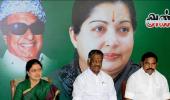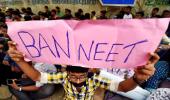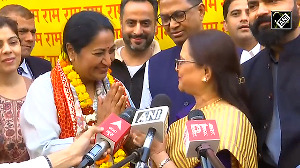The fracas between Chief Minister Edappadi K Palaniswami and his deputy O Panneerselvam on Monday over who will be projected as the CM candidate in next year’s assembly polls not only points to a possibility of another vertical split in Tamil Nadu’s ruling party but will also come as sweet music for the opposition DMK which in the past stood to gain from the AIADMK’s squabbles, says N Sathiya Moorthy.

Reports of simmering infighting in Tamil Nadu’s ruling All India Anna Dravida Munnetra Kazhagam overflowing into the party’s executive committee, at its scheduled meeting in Chennai on September 28, does not surprise political observers.
It was waiting to happen, with Deputy Chief Minister and party coordinator O Panneerselvam, OPS, letting chief minister and joint coordinator, Edappadi K Palaniswami, to have his ways all-round through the past three years of what could at best be described as uneasy cohabitation after they split and re-merged, purportedly at the behest of the ruling Bharatiya Janata Party at the Centre.
If the current tensions continue, leading up to a vertical split for a second time since the death of then chief minister and party strong woman, Jayalalithaa, in December 2016, then the rival DMK parent, under long-time chief ministerial aspirant MK Stalin, can use it to argue ‘political stability’ as a major plank in the upcoming assembly polls, due in May next.
In the AIADMK, such a situation had happened twice already.
Before the post-Jayalaltihaa split and patch-up, the party went through similar motions after the death of party founder and Chief Minister M G Ramachandran, with Jayalaltihaa and MGR’s widow Janaki Ramachandran leading rival factions, contributing to the return of the DMK under M Karunanidhi in the 1989 assembly polls, after a spell of President’s rule.
The current AIADMK wrangling has two parts.
One is about the need for and choice of the party’s chief ministerial candidate for the assembly polls.
The other is for the party to decide on the organisational structure, which under the post-patch-up constitution has created the posts of coordinator and joint coordinator, in place of the unitary general secretary, which posts MGR and Jayalalithaa had held.
For a short while before entering a Bengaluru prison as a co-accused with Jayalalithaa in a ‘disproportionate assets case’, her live-in confidante V K Sasikala Natarajan occupied the seat.
Sasikala’s imminent imprisonment lead to her to anoint EPS as chief minister, only for him to stab her in the back, full and proper.
The post-imprisonment split and patch-up led to re-writing the party constitution, creating two posts in place of one.
Drafted with persona, rather than the party, in mind, the constitutional changes also spelt out that the coordinator and joint coordinator would together select party candidates for all elections, and also have to sign the ‘B Form’ for the Election Commission to allot the AIADMK’s ‘Two Leaves’ symbol, for those submitting nominations in the party’s name.
Having been pushed to a corner through the past three-plus years after re-unification, and not coming forward -- or being able to -- defend the denial of different party and government positions to his supporters, OPS has now squirmed around more than ever, anxious that he should not allow himself to be over-run completely in the choice of candidates for the assembly polls, and ministers and other positions in the government later, if the party won.

OPS’s nervousness became palpable after EPS’s supporters began projecting him as the party’s next chief ministerial candidate from public platforms and in media interactions. This continued even after a truce followed the competitive claims of his supporters for making OPS the chief minister, in wall posters in his Theni district, that too on the morning of Independence Day.
The one to fire a pro-EPS salvo was minister Rajendra Balaji, from the southern region, supposed to be a stronghold of OPS.
At Monday’s meeting, the party’s ageing and ailing presidium chairman E Madhsudhanan, a former minister under Jayalalilthaa, set the ball rolling by referring to oblique demands for his replacement. Having taken sides with OPS in the post-Jaya split, Madhusudhanan told the executive that whoever desired it had to go to the party general council, which alone was authorised to remove or replace him.
OPS, who followed Madhusudhanan, declared that he was Amma’s choice for chief minister thrice. He did not say it, but implied that EPS’s was that of Sasikala, who is perceived to be a hate object for a section of AIADMK cadres and also the party’s traditional voters.
OPS also reportedly clarified that he had agreed to be deputy chief minister only for the residual, four-plus years of ‘Amma’s rule’ (meaning the five years won for the party when Jayalalithaa was alive in May 2016).
EPS, who took the mike next, was quick to retort. He reportedly recalled how OPS and others had revolted against his leadership and did not vote for the trust vote moved by him.
He was possibly hinting at two factors.
One, OPS at the time had only 10 other MLAs on his side (and some of whom have since migrated to the other camp).
If EPS was also referring to the pending DMK’s disqualification petition against OPS and Co from that trust vote, and what Speaker P Dhanapal’s position could turn out to be in the next hearing.
Though supposedly non-partisan, Speaker Dhanapal is often identified with the EPS camp.
Though a shouting match purportedly followed in the closed-door meeting, many second-line leaders were conspicuous either by their silence, or their plea for presenting a unified face of the party in the assembly polls, lest ‘outsiders’ should exploit the situation.
The reference was more to Sasikala, who is expected to be out of prison after serving her four-year prison term, by January-end, more than even the legitimate DMK rival.
At the end of it all, a patch-up was evolved by one of the two deputy coordinators, K P Munuswamy, a Rajya Sabha member still identified with the OPS faction, who was closeted with the two leaders in an ante-room in the party headquarters, after the conclusion of nearly five hours of deliberations in the executive, which also passed 18 resolutions -- eight of them praising EPS as CM.
Talking to media-persons later, Munuswamy, taking over the role unilaterally assigned to Fisheries Minister D Jayakumar of the EPS camp, said the two leaders would together announce the chief ministerial candidate on October 7.
It is easier said than done as the OPS camp is unlikely to give up easily without his being made the party coordinator, nay, possibly general secretary with undivided powers, like MGR and Jayalalithaa -- with exclusive powers to sign the ‘B Form’, if he had to accept EPS as the chief ministerial candidate.
But that is easier said than done. On the procedural front, both propositions have to be cleared by the party’s general council, where neither side is sure of an absolute majority.
Hence, the need for a patch-up of whatever kind. The EPS camp may be elated by the prospects of his being accepted as chief minister, but that is linked to the party winning the assembly polls.

If not, the organisation would matter even more, where OPS would have elbowed out EPS -- anyway leading to another party split.
Should the party win the assembly polls, and if EPS became chief minister, it is taken that he would entice all OPS supporters to his camp, and also possibly get the party statute amended to become the all-powerful general secretary himself.
Whatever that be, any plausible rift in the AIADMK, leading to a visible split, whether formalised or otherwise, pre-poll could possibly lead to the Election Commission freezing the party’s famed ‘Two Leaves’ symbol.
If none else, party leaders, especially chief ministerial aspirants, are obsessed with the symbol that ‘MGR gave us’ and which (alone) has proved to be a talisman for the AIADMK.
They have no explanation why then did the AIADMK lose some or many elections, both under MGR and Jayalalithaa, including the latter’s Bargur seat when she was incumbent chief minister in election 1996.
If this is a hiccup in the eyes of party cadres and leaders alike, outside of the AIADMK, even without a vertical split, any bickering could help the DMK rival to project ‘political stability’ as a sure-fire poll plank in May.
The party is likely to refer to the earlier splits in 1989 and 2017, after the death of MGR and Jayalalithaa, and would tell the voters that there is no charismatic leader in the AIADMK like the other two, to keep the party together, on the strength of their cadre and voter-base.
In comparison, it is argued that the sibling rivalry in the DMK between Stalin and his estranged elder brother M K Azhagiri through much of the last decade did not measure up. It did not cause any split in the party.
What’s more, with patriarch Karunanidhi around, there were limits and limitations for Azhagiri, whom his father also got sacked from the party, leaving behind a hassle-free organisation for Stalin to inherit after his time.
Unlike post-MGR and post-Jaya times, the DMK cadres now want the leadership to keep ‘gentleman politics’ aside for a while and play the real role of being the state’s oldest and strongest party.
Post-Jayalalithaa, anticipating internal trouble with an ailing patriarch bound to the wheelchair, Stalin resisted the temptation of encouraging defections from the AIADMK to try and form an alternate government.
Considering that the assembly polls are anyway due in a few months, and even the ruling party’s problems are all centred on the same, it is yet unclear what the cadres want the DMK leadership to do at the moment, in terms of ‘strategising’ for a troubled AIADMK.
The other question is about the fate of a post-split AIADMK, if at all it came to that (considering that both camps are alive to and aware of the risks and consequences).
Without confirmation from the top, the OPS camp believes that any freezing of the party symbol could lead to their faction aligning with the BJP and regional and sub-regional parties like the PMK in the assembly polls -- offering them a satisfactory number of seats, in return for their accepting OPS as chief minister candidate, possibly at the head of a coalition government.
That still raises the question about superstar Rajinikanth’s promised party for the assembly polls. Having announced that he will not be the chief ministerial nominee of his promised party, the superstar will still have to convince his fans about his decision, including the possibility of a third-party leader as their chief minister.
For all his on-screen adventures and success stories, it is easier said than done, when a party and coalition with him as chief minister candidate, too, is faced with an uphill task against two well-entrenched parties with their long lists of achievements and contributions to the state’s voters, with his advancing age and Covid times not offering any solace or encouragement, either.











 © 2025
© 2025